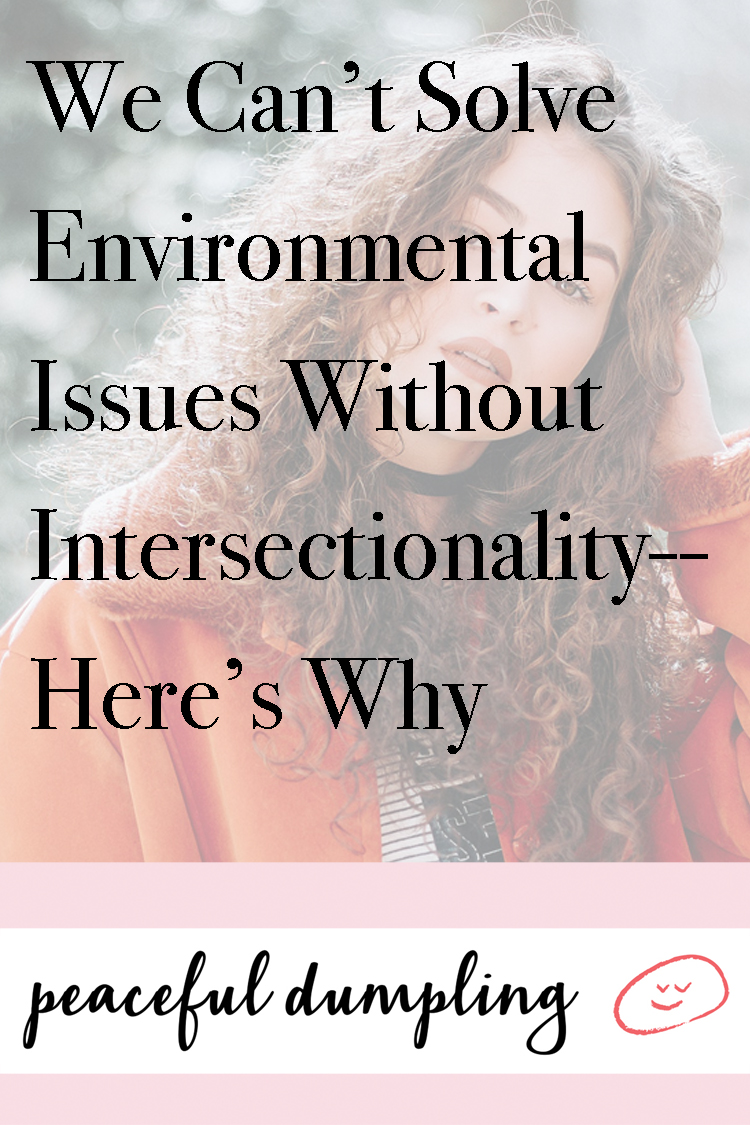A version of this article was previously published on Ethical Unicorn.

We have been seeing some interesting developments in the environmental community. Here’s a brief TLDR if you missed the online drama in the zero-waste world: Package Free Shop, a zero waste shop run by Lauren Singer from Trash is for Tossers, stated on Instagram that anyone can go zero waste. Some followers questioned this assertion politely, and were promptly blocked and had their comments deleted. Now I’m not usually one to weigh in on things such as this, but I did feel like I wanted to write something about this as it symbolizes a much larger issue that I believe we need to maintain awareness of and sensitivity to. Intersectionality.
You may have never heard this term before, and if you have you’ve probably heard it in relation to the feminist movement. Let’s take a closer look at what intersectionality actually is, why it’s important, and why it’s vital that the environmental movement is intersectional.
What is intersectionality?
While the theory of intersectionality was officially created in the 1980s (by the amazing civil rights advocate and scholar Kimberlé Williams Crenshaw – watch her TED talk here), the concept has existed since at least the 1800s, and its core idea is pretty simple. Intersectionality argues that there are multiple aspects of humanity including race, gender, class, sexual orientation, age, body type and many more, and these aspects don’t exist separately from each other. They are inextricably linked, meaning that individuals whose identities overlap with a number of these minority classes will face many more threats of discrimination in their life. For example, I experience oppression because I’m a woman, but I also don’t experience many other forms of oppression because I’m privileged in other areas of my life. I’m white, cisgender, heterosexual, able-bodied and pretty middle class, which means there are a whole ton of ways that my life and experiences are much easier than those of many others.
Essentially, it can be simplified down to the following: everyone has multiple, overlapping aspects of their identities, and all of these connect together to shape how we experience the world and are treated within it. For many, this means that multiple forms of discrimination intersect, and we have to address all of them to create true change.
Seems pretty easy right, so where’s the problem?
Well, we start getting issues as soon as we disregard complex thinking. To be honest, often the people at the forefront of justice movements tend to be a variation of me – white, able-bodied, cisgender etc – because it’s easier for us to get our voices heard in society. Yes, I may have had some barriers as a woman, but I also have more access to technology, finances, education and societal acceptance that have made it much easier for me to have a voice than say, a disabled woman of color. This doesn’t invalidate my personal struggle in any way but simply recognizes that there are certain elements that are more accessible to me than others. But if the majority of people fronting a movement, whatever it may be, are in a similar spot to me, it’s also very easy to disregard all the other elements that are at play for everyone else. Because I’ve never been personally affected by certain considerations, it would be incredibly easy for it to never even occur to me to think about trans people, older people, disabled people, queer people or immigrants (to name a few), when I’m talking about justice and progress in the world.
Why white feminism sucks
And this is where we often end up with white feminism. Check out this video, which breaks down the concept simply and easily:
So if you’re white and a feminist, that isn’t a bad thing, not all white people are white feminists. We do, however, have a problem when someone’s activism ignores intersectionality. Often times this is unintentional (because, hello, we live in a society created to favor the privileged) but, if we don’t identify it and work to change our activism, we do serious damage. Not only do huge numbers of people feel completely excluded from activist movements, but these movements strive for goals that only help white, cis and straight people. Activists may think they’re moving towards important social change, but they’re really only creating progress for a very small, very limited number of people.
If your activism isn’t intersectional, you aren’t actually doing good in the world. You’re just helping those who already hold privilege.
As you can probably imagine, intersectionality has an important role to play in environmental activism. When we pause to consider how varied lifestyles are across the world, it’s clear that not every person in every country has access to more progressive waste processing facilities or goods packaged sustainably. This is why it’s impossible to say that there’s one best approach for reducing waste across the world. Doing so ignores the vast majority of people on the planet and may actually hinder the cause as a whole. If we’re to move forward and help everyone, it’s time to start having a more nuanced conversation about eco activism.
Underserved communities are disproportionately affected by environmental issues such as air & water pollution, pesticides, and climate change. So it’s impossible to disregard socioeconomic and racial issues when understanding–and trying to solve–environmental crises. And saying that any individual, regardless of their circumstances, can simply be eco-friendly along the lines of white, privileged, North American or European environmentalists is naive and exclusionary.
Read more about the importance of intersectionality in environmental activism on Ethical Unicorn.

Also by Francesca: There’s More To Ethical Beauty Than Cruelty-Free. How To Avoid Child Labor Products
Relate: I Did Zero Waste For A Month & Believe *This* Is The Solution To Our Trash Problem
No, Meat-Eating Isn’t More Sustainable Than Being Vegan. The Truth About Food Yield Study
Get more like this—Subscribe to our daily inspirational newsletter for exclusive content!
__
Photo: Pexels
